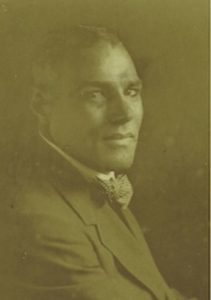
Edwin Harleston
*On this date, in 1882, Edwin Harleston was born. He was a Black painter. From Charleston, S.C., Edwin Augustus Harleston was one of eight children; his father was a rice planter and a sea captain and owned a funeral home.
Harleston received a scholarship to study at the Avery Normal Institute in Charleston and graduated valedictorian in 1900. He attended Atlanta University for four years, playing football and singing in a quartet. In 1905, he relocated to Boston to attend the art school of the Boston Museum of Fine Art. There, he studied under William Paxton and Frank Benson until 1913.
The seven-year course was formed under the Beaux Arts tradition and formed the foundation of his style. Harleston reluctantly returned to South Carolina to help in his father’s funeral home. During this time, he became active in local American Civil Rights and eventually became president of the newly formed Charleston branch of the NAACP. He led an effort that forced the public school system to hire Black teachers. In 1920, Harleston married Elise Forrest, a photographer, and two years later, they opened a studio that featured both of their works.
Influenced by much of her work, he developed a highly realistic and academic portraiture technique; many of his works were commissioned. Some of his subjects were the president of Atlanta University, philanthropist Pierre S. Dupont, and the president of Atlanta Life Insurance Co. Harleston. Other paintings include The Bible Student, 1924, and Miss Bailey with the African Shawl, 1930.
At Aaron Douglas' request, he assisted in painting murals for Fisk University, depicting a panoramic view of Black history from slavery onward. This work was completed in 1931, the year that he died. Shortly before his death, Edwin Harleston received the Alain Locke Prize for portrait painting for his work The Old Servant at an exhibition of the Harmon Foundation.
Edwin Harleston died on May 10, 1931.
The St. James Guide to Black Artist
Edited by Thomas Riggs
Copyright 1997, St. James Press, Detroit, MI
ISBN 1-55862-220-9